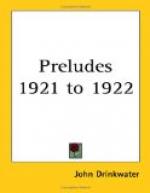THE MAID OF NAAMAN’S WIFE
That was the proud woman, Naaman’s wife.
Basking at noon under the Syrian fans,
While Naaman, the leprous mighty captain,
Proud glowing flesh now silver-skinned and tainted,
Walked in contagion here and there, apart.
His wife, the unblemished Naaman in her mind,
The man who, coming with the spoils and shouts,
Had made a hundred triumphs hers, when all
The Syrian women courted her for that,
Now saw in the pestilent limbs shame and reproach,
Some treachery that made her, who was mate
Of Syria’s pride, bondwoman of a leper.
She must nurse her blame, since he was Naaman still,
With an old honour paid by stedfastness,
The mark of Syria’s compassion. Black
Thoughts were her only payment for betrayal,
But in secret she could play them without pity,—
Let the fans beat, they could not beguile her from
that.
.....
And Naaman had loved her, but not now,
Knowing the uses that his love had been,
How given for her to squander it in pride.
.....
Syria out of Israel had brought
Captives, and among them one, a maid,
A little maid, just troubled with the touch
Of womanhood upon her body and thought,
And she served Naaman’s wife, a lonely girl,
To answer bidding, and covet little tones
Of kindness that she heard go to and fro,
But not for her. She trembled as she stood
At the proud woman’s couch, because a fault
In orders done meant scolding and even rods.
And she had but two joys. One, to remember
A Galilean town, and the blue waters
That washed the pebbles that she knew so well,
Yellow in sunlight, or frozen in the moon,
A little curve of beach, where she would walk
At any hour with an old silver man.
Her father’s father, her sole companion,
Who told her tales of Moses and the prophets
That lived in the old days. And of that time
She had but now poor treasuries of the mind,
Little seclusions when, the day’s work done,
She made thought into prayer before she slept;
These, and a faded gown that she had brought
Into captivity, patterned with sprigs of thyme,
And blades of wheat, and little curling shells,
And signs of heaven figured out in stars,
Made by a weaver that her grandsire knew,
A gift on some thanksgiving. She might not wear
it,
Being suited as became a slave, but often
At night she would spread it in her loneliness,
And think how finely she too might be drest,
As finely as any proud woman of them all,
If the God of Israel had not visited her
Surely for sin, though she could not remember.
Thus one joy was. And then the Lord Naaman,
This wonder soiled, this pitiful great captain
Forbidden all that he had so proudly been—
To worship him, that was her other joy.
When the dusk came, and the city fell to silence,




